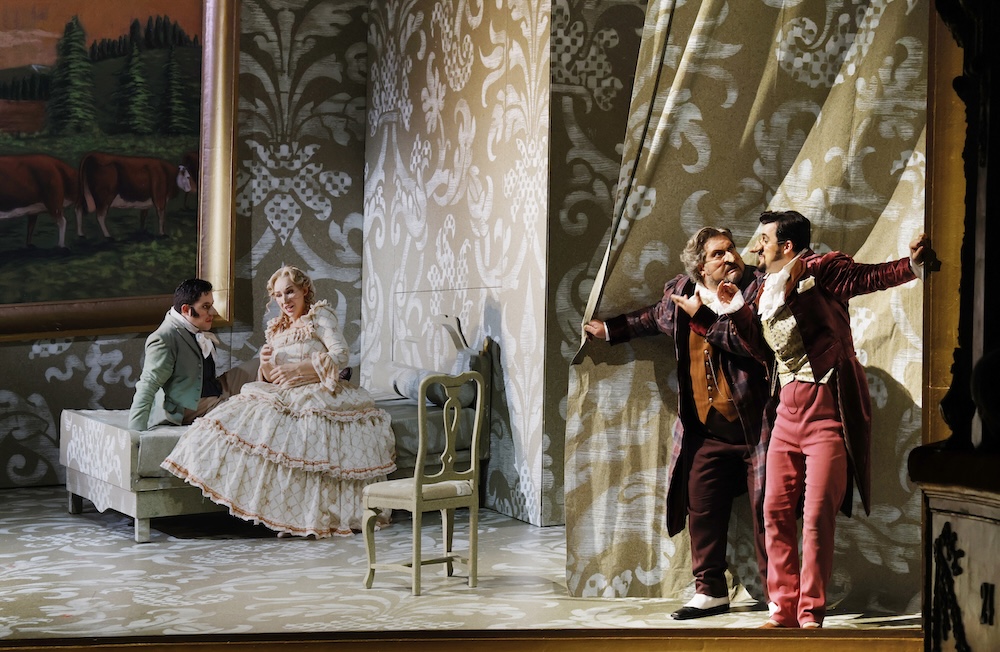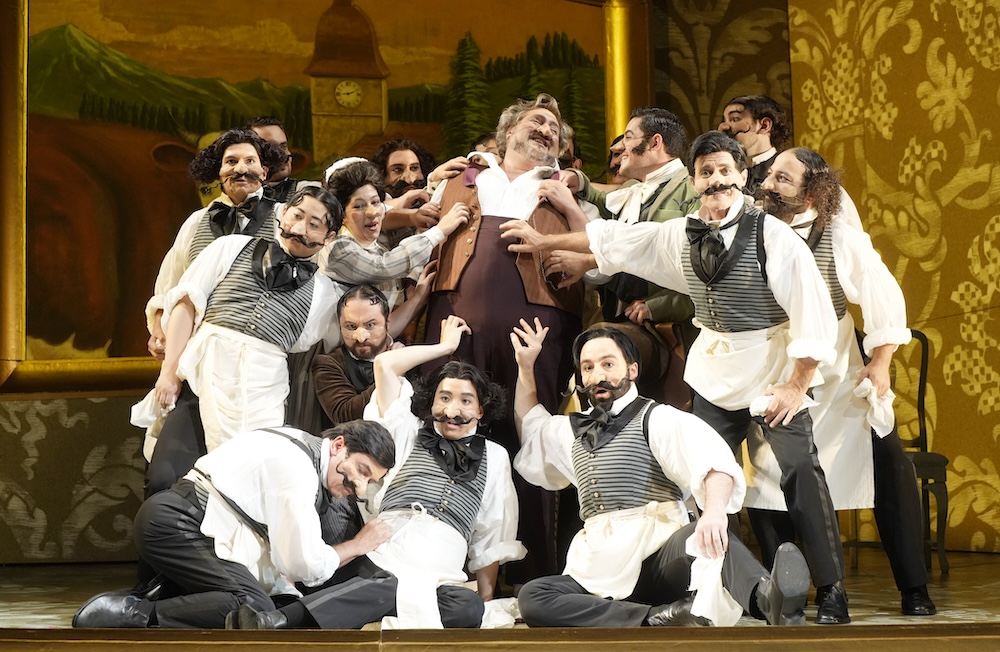L’equivoco stravagante (1811) had only three performances before it was pulled by the censors. This is the same year its 19 year old composer was hauled off to prison for his threats to whip a couple of choristers.
In Rossini’s operatic oeuvre L’equivoco is only preceded by La cambiale di matrimonio. Rossini chose a libretto stuffed with zany word play, vulgarities and “equivocal,” I.e. sexual, meanings. Tasteless indeed, it was well deserving of the censor’s disgust. Meanwhile it made Rossini famous.
A silly, pretentious, nouveau riche farmer’s daughter is slanderously said to be a castrato, thus scaring off an unwanted suitor. In the spirit of the times the masterminds were sly servants who sought to make true love triumph over vanity, exploiting the laughable attempts of the farmer and his daughter to appear highly educated, as presumed, they assumed, by their wealth.
Penniless Herman loves Ernestine from afar, the servants Frontino and Rosalia determine that Herman pretend to be a professor of philosophy. Meanwhile Ernestine’s father Gamberotto plots to marry Ernestine off to the cocky (double entendre) Buralicchio for financial advantage. Ernestine just wants to go to bed with someone.

All this played out in the 19 musical numbers created by the young composer reared in the traditions of opera buffa — cavatinas, arias, duets, plentiful trios and quartets, plus he added a unique patter quintet as well as grand finales with male chorus. The incipient brilliance of Rossini is all there, if not the polish of a finished technique and the dramatic sophistication of many of his later works.
The original, 2019 Moishe Leiser and Patrice Caurier production was mounted in the Vitrifrigo (a maker of boat refrigerators) Arena (15,000 seats) transformed into a 1100 seat, fully equipped, modern proscenium theater, a space that usually hosts the famed comedies and the grand tragedies of Pesaro’s prodigal son. The venerable 700 seat, Italian style Teatro Rossini, usually the home of minor Rossini, was closed for repairs.
Re-opened just now after a major restoration the Teatro Rossini hosted a much reduced L’equivoco, scaled to fit an early nineteenth century (1813) stage (the theater took on the Rossini name only in 1854). Now housed in an appropriate theater the Leiser/Caurier production found the vitality of the excited young composer allowing L’equivoco to become the cocky piece Rossini intended.
The intimacy of the theater thrust our attention onto the performers, as does the minimalism of the Leiser/Caurier production — a room and its ceiling within a gold proscenium picture frame, the walls covered with a repeating, large stenciled silver motif. A smaller gold frame enclosed a painting on the back wall, a cow staring us in the face (lead photo, with Ernestina). The all male chorus wore identical costumes and mustaches, and everyone in the cast wore exaggerated prosthetic noses, creating a clownish ambience where this farmer’s daughter joke could easily happen.
First it was the grandiose language that amused us, filled with ribald, double meanings, many caught by the English language subtitles, many lost. Then we were smitten by Buralicchio’s cock like costume –– a pushed out chest and a protruding butt — that crowned his lusty entrances. And finally, cherry on the cake, it was the silly, upside-down idea of a castrato pretending to be a woman that made us groan (castration was a disappearing operatic phenomenon in Rossini’s new century, mezzo sopranos taking the high voiced male roles).
The farmer Gamberotto was played by famed Rossini buffo bass Nicola Alaimo (Pesaro’s Guillaume Tell). Mr. Alaimo boasts everything you wish for a buffo — an imposing figure, a voice that can boom as well as negotiate the lightening speed of the patter when things get confusing (and there is so much to say and so little time to say it).
The farmer’s daughter Ernestina was played by Russian mezzo soprano Maria Barakova, a natural comedienne who rendered the farmer’s daughter’s lust quite urgent. This fine young singer was a participant in the Accademia Rossiniana in 2018 (the Rossini Festival’s training program) and has since developed an impressive career in major Western theaters.
The cocky Buralicchio was played by Spanish baritone Carles Pachon. This young artist exuded the cocky confidence of his costume, finding all the considerable courage needed to confront an artist of Mr. Alaimo’s stature. A recent participant in the Berlin Staatsoper he is now a member of that company.
Ermanno, the penniless suitor, was sung by Italian tenor Pietro Adaini, also a recent participant in the Accademia Rossiniana. He was confused as needed, then able to pull himself together to impersonate a philosophy professor, and finally to rescue the imprisoned Ernestina and pile into bed with her.
The farce’s instigators, Gamberotto’s sly servants, were played by Patricia Calvache as Rosalia and Matteo Macchioni as Frontino.

Italian conductor Michele Spotti conducted Pesaro’s Filarmonica Gioachino Rossini, offering from time to time the very great satisfaction of a fine Rossini delirium. The men of the chorus of the Teatro Della Fortuna of Fano, a nearby town, gamely scratched at their flea bites, a comic conceit inflicted by the directors, while singing with Rossinian pizazz.
Michael Milenski
Teatro Rossini, Pesaro, Italy, August 16, 2024. All photos copyright Amati Bacciardi, courtesy of the Rossini Opera Festival.